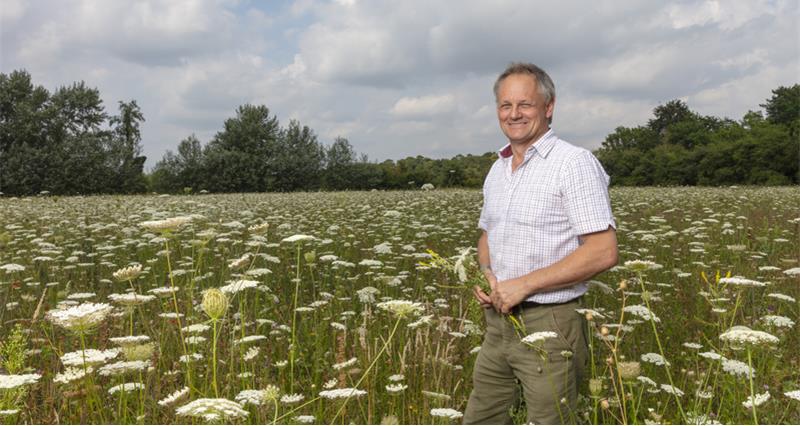Recently appointed as NFU County Chairman for Suffolk, Andrew has been the Estate Director at the Euston Estate for 11 years, a 10,500 acre estate located in Suffolk.
The estate is situated on the Brecklands, an area that stretches across Norfolk and Suffolk, notorious as one of the driest areas in England.
A yearly average of 600 millimeters of rain falls, with 1 in 6 years dropping to half the average.
The Brecklands are considered a unique landscape characterised by lowland heath habitat and shallow, sandy soils which contain less than 5% clay and are inherently low in organic matter. Nicknamed ŌĆśBreckland blowing sandŌĆÖ, the soils are easy to cultivate and well drained, although prone to compaction, erosion and have poor water retention.
Farming operation
ŌĆ£We actually lose more through evaporation in the summer than we gain through rainwater in the winterŌĆØ
Andrew Blenkiron, NFU County Chairman for Suffolk

Figure 1. One of the two reservoirs on the Euston Estate, currently in deficit due to the drought, declared in Suffolk on the 12th of August.
The farming area at the Euston Estate comprises a mixed-farming operation of 7,000 acres: 1,200 acres of irrigated root crops such as potatoes, carrots, parsnips, and onions; 500 acres of sugar beet; 1,200 acres of cereals such as seed barely and milling wheat; 1,500 acres of grassland; 1,800 acres of maize and rye; 200 acres for pigs and 100 acres for chickens. The remaining land area is in a variety of environmental management schemes such as bird seed, game cover and buffer strips.
Soil management
The Breckland soils are great for growing root crops because there is no structure to constrain their growth. Although, the lack of structure also makes them at risk to soil erosion, prone to drying out and vulnerable to environmental stress. Furthermore, the inherently low in organic matter content of the soils have seldom been greater than 2%.
As Estate Director, Andrew works hard to increase the environmental resilience of their soils. Animal manures such as pig and poultry have been introduced more to return organic matter back into the farming system.
Moreover, 800 acres of cover crops are grown, with some areas being grazed by sheep and other areas being chopped and ploughed back in as a green manure. The use of green manures is beneficial because they build organic matter, structure, nitrogen, prevent leaching, provide ground cover and can encourage weed suppression. Overall, an average increase of 1% organic matter can be observed over a 10 year period across the farm.
Regular soil and plant tissue testing on a rotational basis is also practiced, allowing effective nutrient management.
Water management
Effective water management on the estate is of elevated importance due to the changing climate and inherently vulnerable soil. To ensure sufficient water year-round, the estate has built two reservoirs, served by a river running through the estate.

Figure 2. Irrigator being used on an onion crop.
Reservoirs
The estate has primarily invested in storage to increase water security. The first reservoir has a capacity for 100 million gallons, an area of 25 acres and is 13 meters deep. The second reservoir stores 80 million gallons, 25 acres in area and 10.5 meters deep. Funding available in 2014 provided a grant of 35% for the second reservoir.
The reservoirs are filled from surface water from rivers in the winter. If the river reaches a certain level, the Environment Agency grant permission to pump water to the reservoirs, allowing storage for summer use.
The estate also has a borehole which pumps around 20% of the supply for the estate. The reservoirs provide enough capacity to store water for 1 and ┬╝ seasons. However, during this summerŌĆÖs drought (2022), the ┬╝ season that is usually in reserve has been used, triggering concern regarding the future for water security on the estate.
Efficient water use
The estate carries out good water practices to ŌĆśbe smartŌĆÖ with their water. Good irrigation scheduling, where crops are targeted with what they need, when they need it, is crucial to effective and economic water use. Technology is crucial for efficient water use, a ŌĆśRaindancer GPSŌĆÖ is used which enables monitoring and control of irrigation in real time.
The irrigation system is monitored, feeding back detailed information about water pressure, allowing leaks to be identified and resolved quickly. Windspeed, temperature and sunlight are also monitored to estimate evapotranspiration rates, enabling better targeting of the water resource.
Building resilience for future water security
A changing climate has seen increased trends of warmer summers and changing rainfall patterns. With the added vulnerability of Breckland soils, resilience is crucial for provision of food and fiber. Andrew has dedicated 10% of the arable land area to paulownia trees, the first UK planting on a field scale. These trees grow fast and sequester 6x more carbon than other trees, being valuable to the carbon sequestration market.
The estate is on a lease arrangement with Carbon Plantation Ltd, where the trees produce structural grade timber for construction. This has reduced the need for water use on high value crops. Furthermore, another 10% of the arable land will be used for solar panels to generate renewable energy.
In addition to reducing root crop area, the estate will continue with efficient water use and will consider building another reservoir in future.
